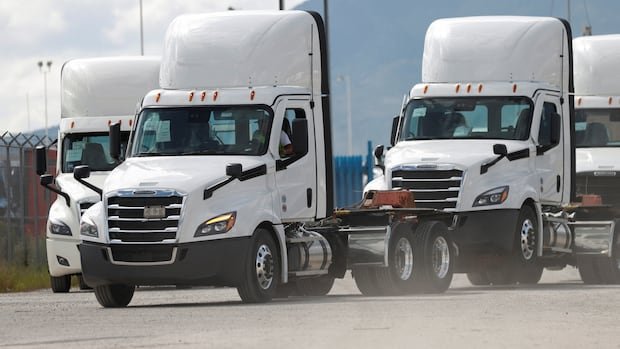All medium- and heavy-duty trucks entering the United States will be subjected to a 25% tariff starting November 1, as announced by President Donald Trump on Monday. This decision marks a significant step in the administration’s efforts to safeguard American companies against foreign competition.
President Trump had previously mentioned that heavy truck imports would be subject to new duties by October 1, citing national security concerns. The implementation of these tariffs aims to shield manufacturers from what is perceived as unfair external competition, with companies like Paccar-owned Peterbilt and Kenworth, as well as Daimler Truck-owned Freightliner, expected to benefit from this move.
In existing trade agreements with Japan and the European Union, the U.S. has agreed to impose 15% tariffs on light-duty vehicles. However, it remains unclear whether this same tariff rate will apply to larger vehicles.
Furthermore, the Trump administration has permitted manufacturers to offset the value of U.S. components from tariffs paid on light-duty vehicles assembled in Canada and Mexico.
The category of larger vehicles encompasses a wide range, including delivery trucks, garbage trucks, public utility vehicles, transit buses, shuttle buses, school buses, tractor-trailer trucks, semi-trucks, and heavy-duty vocational vehicles.
The U.S. Chamber of Commerce has urged the Commerce Department against imposing new tariffs on trucks, pointing out that Mexico, Canada, Japan, Germany, and Finland are the top five import sources, all of which are allies or close partners of the U.S. and pose no national security threat.
Mexico stands as the leading exporter of medium- and heavy-duty trucks to the U.S., with imports of these vehicles from Mexico having tripled since 2019 to approximately 340,000 today, according to government data.
Under the Canada-U.S.-Mexico free trade agreement (CUSMA), medium- and heavy-duty trucks are exempt from tariffs if at least 64% of a heavy truck’s value originates in North America, inclusive of parts like engines and axles, raw materials such as steel, or assembly labor.
The tariff implications extend to Stellantis, the parent company of Chrysler, which manufactures heavy-duty Ram trucks and commercial vans in Mexico. Stellantis has actively lobbied against imposing high tariffs on its Mexican-produced trucks.
Additionally, Sweden’s Volvo Group is constructing a $700 million heavy-truck factory in Monterrey, Mexico, set to commence operations in 2026.
Mexico is home to 14 manufacturers and assemblers of buses, trucks, tractor trucks, and two engine manufacturers, as reported by the U.S. International Trade Administration.
Expressing opposition to new tariffs, Mexico informed the Commerce Department in May that Mexican trucks exported to the U.S. contain an average of 50% U.S. content, including diesel engines.
In 2020, the U.S. imported nearly $128 billion in heavy vehicle parts from Mexico, accounting for around 28% of total U.S. imports in this category.


